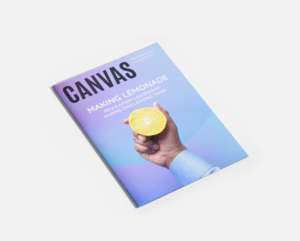
A very wide-ranging mix of Whitehall, private sector and regulatory experience combines in Bill Moyes to create unique insights and perspectives, which are complemented by a genuine commitment to finding the best solutions for the affected public. With firm-held views about deriving and demonstrating impact through the organisations he has worked with and lead, Bill advocates for challenge and learning to bring about successful and positive change.
As we emerge from the very challenging environment of the Covid pandemic and are faced with a public consumer crisis it is vital that organisations such as the Accounts Commission can work proactively at local and national level to make a real impact. We are delighted that Bill agreed to talk to us and share his views and experiences with such candour and clarity.

Your role as Chair of the Accounts Commission for Scotland started in January 2022. What is sitting in your in-tray in that role?
My focus has been to try and work out how we can be a more effective organisation. When I was appointed, I asked the Scottish Government what they wanted me to do, and it was acknowledged that while the audit work was good, the desired impacts were not being achieved and that was a real area for improvement.
This has taken us into a change programme, designed to raise our profile and explore in more detail what impact means. I believe impact means better services for the public. More and better media coverage for the Commission is welcome, but it’s not sufficient. The general public, Scottish politicians and the elected members and staff of local authorities want the Commission’s reports to lead to tangible improvements in how local services are designed and delivered, and in what they cost.
I am trying to move the Commission to be not only a supporter of those local authorities which are experiencing difficulties, although this is very important, but to challenge them too. Most people agree that Scottish local authorities performed to a very high standard during the lockdown – redesigning services and ensuring that central government funding quickly reached the groups for which it was intended.
There needs to be lessons learned from the pandemic as well as pushing back on the things we had to do to get through the pandemic but that we don’t want to retain in the long term. We need to be more sceptical and ensure that problems are being seen earlier on and actions taken. There is a lot of transformational change happening and if we are not careful important elements will be lost.
There is a lot of good data about the performance of different services in each local authority. And there are a number of projects on how services can be improved. The Commission welcomes that. I hope the Commission can develop the capacity to give the Government an objective and realistic picture of the consequences for local authorities and service users of some of their decisions and policies. That doesn’t take us into lobbying, but it does fill a gap in the understanding of local authorities and will derive the impact we need. I really want the Accounts Commission to be doing more of that.
The cost-of-living crisis presents considerable challenges for the public. What can an organisation such as the Accounts Commission do to help?
We see the public as being our ultimate customer. Therefore, it is really important that we can give them reassurance that the bodies we oversee, which are more than 100, are operating efficiently, effectively and economically. We will be trying even harder than in the past to ensure that those organisations are not wasting public money and that people are not having to pay more than they should for the services that they want.
We have no doubt that across Scotland there are lessons to be learned from the pandemic about how to use the workforce more effectively and how to cut costs – and keep them cut. We want to encourage local authorities to think about that, and while we know that there are different challenges in different areas, change is needed. Ultimately this equates to better quality services that reflect the needs and priorities of local people, and decreasing costs.
You were formerly Chair of the General Dental Council and the Gambling Commission. What are your reflections on how they will need to evolve to face the challenges in those sectors in the years ahead?
The General Dental Council was interesting as the role was to protect the public by regulating professional behaviour An important part of this was the investigation of allegations that a dentist or dental care professional was not fit to practice their profession.
The law was not helpful to us or to the public. It required the GDC to prove that the dentist or dental care profession was currently unfit to practice. The thing that used to concern me was the way that the dental defence unions, which insure dentists and offer them legal advice, often tried to delay a GDC decision for as long as possible so that their client could continue with professional development and have more time to address specific areas of concern and therefore would be judged as fit to practice when their case eventually came to be determined.
So, a system intended to protect patients, could be subverted to become a means of protecting professionals whose It would do the profession good to recognise that and make sure that serious action was taken quickly.
Gambling in Great Britain is a large and technically-sophisticated industry. Around 22m people gamble at least once every month. The job of the Gambling Commission is to ensure that the industry is free from crime, that it is conducted in a fair and open way and that vulnerable groups are safeguarded.
During my time as Chair I focussed the Commission’s work increasingly on detecting and preventing gambling harms. This was a fairly significant change.
I feel pleased that we managed to persuade ministers at the Department of Culture, Media and Sport and the Department of Health and Social Care that problem gambling was a significant public health challenge which needed to be addressed as such. The view of the Commission changed to reflect that its primary role was not to support the industry, but to support gamblers and to ensure that the industry played a major part in this effort.
Gambling is legal and the Commission didn’t take any stance on whether it was good or bad. People should be allowed to gamble if that is what they want to do. But the great danger is that people are enticed into a habit they cannot support and that has all sorts of serious consequences.
During my time as chair there were about 350,000 people who were serious problem gamblers – addicts – and a further two million who were on the cusp of it. I felt very strongly that it was a significant public health problem and needed to be dealt with as such. To do that properly the legislation had to be strengthened. As I left my post the Commission was starting to make an impact on ministerial thinking. But the promised White Paper remains a work in progress.
“I think the pandemic has demonstrated to citizens and employees that things can be done differently and, on the whole, be done better.”
Have you noticed major differences in how government and regulators in Scotland and England view their role and remit or how they approach tackling issues?
It is different, certainly in my experience. One reason is that a lot of big companies are not head-quartered in Scotland and the regulatory regimes within which they operate tend to be UK or GB regimes. Regulation in Scotland tends to be more public sector focused. There are exceptions, but generally speaking, this is the case.
Since I took up this role in January I have been very interested to see the extent to which the Scottish Parliament is involved. Much more so than with regulatory bodies in England, where I was very occasionally summoned to appear for a select committee at Westminster.
In the past several months I have spent a fair amount of time meeting different Committee Conveners. It seems to me that there is much more camaraderie between MSPs in Scotland compared to their peers in Westminster without the same kind of tension amongst Select Committees.
While I think there are positives in this and enables more opportunity to explore issues with less party-political point scoring, there is the potential for it to become a bit too cosy. I would question whether MSPs should be a little bit more challenging of the regulators in Scotland. We challenge local authorities and they should be able to challenge the regulator from time to time.
You have led the boards of a number of organisations undergoing significant change. How do you think the long-term effects of pandemic, such as hybrid working, will change the way in which the public sector works?
I think the pandemic has demonstrated to citizens and employees that things can be done differently and, on the whole, be done better. Every local body I have spoken to in Scotland has case studies that can demonstrate how they have positively changed systems and approaches. It will be really important for Government and Local Authorities to ensure that any obstacles are removed to allow them to do things differently and better.
However, we do need to ensure that we are not cutting people off from public services. We have a cadre of older people who could be at danger of this because they don’t have access to the internet. I think that is one thing that local public bodies really must think hard about until we get to a point when every generation is technically literate which is some way away. As part of this all public sector bodies and governments should be encouraging greater conversation with technology companies to ensure that services and technical applications and innovations can benefit citizens.
“We challenge local authorities and they should be able to challenge the regulator from time to time.”
How can a regulator engage with consumers to ensure that good regulation empowers and protects the public difficult times like this?
That is one of the biggest challenges for all the regulatory bodies I have been involved with. In the Accounts Commission we are considering this very issue at the moment. We have a specific programme and we consult on it but we don’t really get much feedback from the public. But we absolutely do need to address this so we can work out whether we are drawing the right lessons about topics that we are looking at. If we can get the public genuinely engaged in basic, but fundamental things like bins and roads we have more opportunity to engage on more complex areas – e.g. the education system and the care system.
The creation of the National Care Service in Scotland is going to require a huge amount of contact and interaction with the public to discuss systems and processes and how it is going to work. This may be something that the public can relate to. It is a huge upheaval for local authorities and for large parts of the Health Service and if we have not engaged the public properly by the time this legislation comes to be implemented we are going to have a real problem.
The public’s voice is really important in this and it can’t just be a consultation document which asks to validate the proposed approach. We need to be thinking broadly about communication and engagement and considering a much more authentic, wide-ranging and demonstrable approach.
Dr Bill Moyes – Biography
Bill is the current Chair of the Accounts Commission for Scotland, which holds councils and other local government bodies in Scotland to account and helps them improve by reporting to the public on their performance. He has extensive experience of regulation, having chaired the Gambling Commission, which regulates all forms of commercial gambling in Great Britain and the National Lottery; the General Dental Council, which is the professional regulator of dentists and dental care professionals in the UK; and Monitor (the Independent Regulator of NHS Foundation Trusts). Prior to these appointments he was a board member of the Legal Services Board and the Office of Fair Trading.
Outside the field of regulation his previous non-executive directorships have included the Priory Hospital Group; the Council of the University of Surrey and chair of its audit committee; the Chairmanship of the Board of Governors of Heythrop College (a constituent college of the University of London); and being a trustee of the Catholic Trust of England and Wales.
His executive career included a range of Civil Service policy-making roles in Whitehall, including the Economic Secretariat in the Cabinet Office, and in various departments of the then Scottish Office; Head of Infrastructure Finance in the Bank of Scotland; and Director-General of the British Retail Consortium.
Bill was educated at Edinburgh University, where he completed a Ph.D. in theoretical chemistry.
